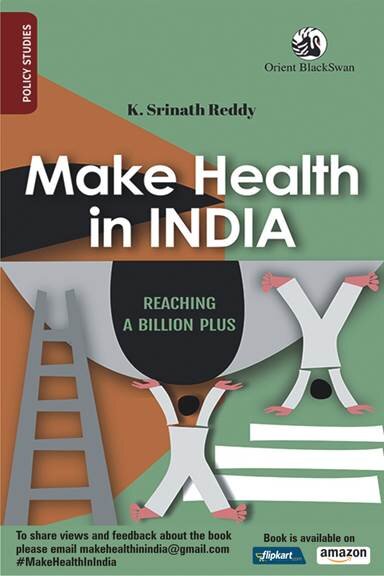The World Health Organization (WHO) is developping a...
23 July 2019
Newly Published Book on Health Policy by Professor K Srinath Reddy, provides a concise analysis of India's journey towards universal health coverage and an updated commentary on Ayushman Bharat

July 20, 2019 Hyderabad/ New Delhi:
A new published book Make Health in India: Reaching A Billion Plus by Professor K. Srinath Reddy, published by Orient Black Swan critically analyses the various policy initiatives undertaken over the past 15 years to improve access and affordability of health services with particular attention to the National Health Policy of 2017 and Ayushman Bharat unveiled in 2018.
India's health policy has attempted to address these challenges through major initiatives that commenced in 2005. Though these have opened the road to universal coverage (UHC), there is a long way to go and more reforms need to be undertaken. The book profiles the growth of the National Health Mission and the performance of government funded health insurance schemes.
Detailing the key highlights of the book, Professor K Srinath Reddy, author of the book Make Health in India which is a part of the Policy Studies Series said, "The storyline of the book is the staccato progress of India's progress towards UHC. Based on the national and global experience it the provides a set of actions that can create a coherent framework for promoting and protecting the health of all Indians. The book provides a narrative of how India's health policy has evolved over the past 15 years, set against the need to provide universal health coverage through an efficient health system and improve the social determinants of population health."
The book details the challenges arising from a weak health system and adverse socio -economic determinants of health. The author traces India's evolving journey towards Universal Health Coverage. Those working in government and development organisations and interested members of civil society will find it useful as will students of public health and public policy.
The book is part of the Policy Studies Series. The series editors are Mr C. Rammanohar Reddy, Prof. Praveen Jha and Prof Neera Chandhoke.
For more information / book reviews, please contact: Gina Sharma +91 9811887088
About the author:
Prof. K. Srinath Reddy is presently President, Public Health Foundation of India (PHFI) and formerly headed the Department of Cardiology at All India Institute of Medical Sciences (AIIMS). He was appointed as the First Bernard Lown Visiting Professor of Cardiovascular Health at the Harvard School of Public Health in
(2009-13) and presently serves as an Adjunct Professor of Epidemiology at Harvard (2014-2023). He has also been an Adjunct Professor of the Rollins School of Public Health, Emory University and Honorary Professor of Medicine at the University of Sydney. He has been a consultant to the World Health Organisation and served as President of the World Heart Federation. He co-chairs the Thematic Group on Health for the UN Sustainable Solutions Network. He chaired the High Level Expert Group on Universal Health Coverage in 2010-11. Widely regarded as a leader of preventive cardiology at national and international levels, Prof. Reddy has been a researcher, teacher, policy enabler, advocate and activist who has worked to promote cardiovascular health, tobacco control, appropriate nutrition across the life course, chronic disease prevention and healthy living across the lifespan. He has more than 500 scientific publications in international and Indian peer reviewed-journals.
Prof. Reddy obtained his medical degree from Osmania Medical College (Hyderabad), M.D. (Medicine) and D.M. (Cardiology) degrees from the All India Institute of Medical Sciences (Delhi) and M.Sc.
(Epidemiology) from McMaster University (Hamilton, Canada).
[cid:image003.jpg@01D53EF9.7BB0F0B0]
For more information / book reviews, please contact:
Gina Sharma
+91 9811887088
